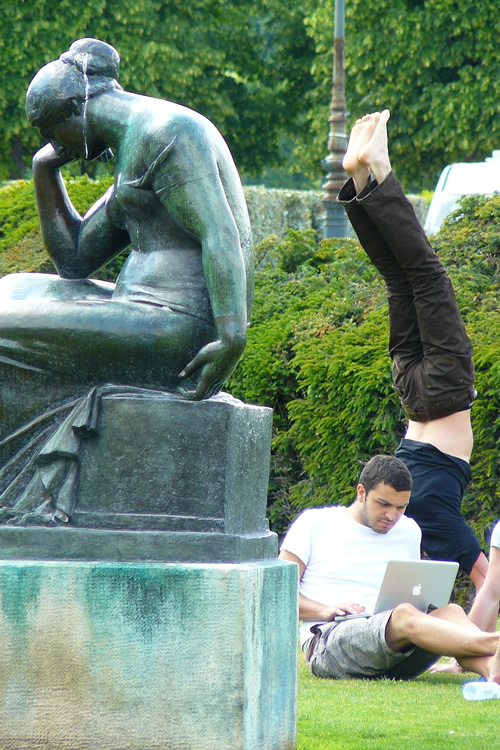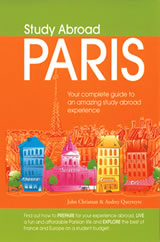Study Abroad in Paris
Tips for Your Semester Abroad in the City of Lights
by Audrey Queyreyre and John Chrisman

|
|
There are a variety of ways to study
abroad in Paris...
|
Deciding where to study abroad is both an exciting and challenging step. You have a lot to consider, from local culture to the cost of living. While a recent shift shows many students are exploring new destinations for their time abroad, traditional cities such as Paris remain popular for their perfect blend of prominent local culture and international atmosphere. If Paris is on your list as a place to visit, here are some tips from Study Abroad Paris: Your Complete Guide to an Amazing Study Abroad Experience, a guidebook for getting you started on an exciting, overseas adventure:
Preparing for your Semester
We know what you’re thinking: the thought of leaving the comfort zone of your university, friends, family, even your country and native language to spend a semesterliving in Paris is intimidating. Don’t worry; it’s the exact same feeling that over 200,000 of your fellow university students experience each year before studying abroad. We can only say it’s a decision you will not regret.
When To Go
There are two main semesters: First semester (early October to mid-January) and Second semester (early February to mid-May). Many programs designed for international students finish in December as opposed to January, allowing you to return for your spring semester to the United States.
Fall is an excellent time to go to Paris. The weather is still good and most of the summer tourist season has finished. With most French students also starting classes, this is a great time to meet local residents.
Winter is a good time to visit the museums and some of the top sites in the city, because the lines and crowds at most attractions are at a minimum.
Summer is very popular for students and tourists. Days are warm and sunny, and attractions and transportation schedules are in full operation. However, keep in mind, most French students will be on break; therefore, you’ll probably be studying with a majority of international students.
Cost
Money is an important issue for any college student. Consider enrolling directly with a university in Paris (this option is not for everyone since there are more administrative steps to go through and you may need to be fluent in French). French universities are inexpensive. You will have to pay administrative fees, which can vary from €170 (about $220) to €900 (about $1,170) — the fee increases with the level of study, and, if applicable, a subscription to “sécurité sociale étudiante” (roughly €190 or $247).
If you do decide to go with a program provider in America, an average semester program in Paris is $12,500. A summer semester is $6,000. These costs are only examples and vary by program. While $12,000 is not cheap, keep in mind that it includes tuition, which is typically at least 12 credit hours or more per semester, housing, excursions, and often some meals (if you’re with a host family, typically breakfast) as well as staff services on-site.
Most universities suggest a budget outside of school costs and airfare of about $950-$1,250 per month to cover your housing and living expenses. However, it’s very easy to spend more than double that if you live in an apartment in the city center, eat out often, go to bars, clubs, concerts, and travel frequently.
Housing
While housing may be included, you should understand your options. From renting a private apartment to living in dorms, or with a host family, Paris offers all types of long-term accommodations. Each arrondissement of Paris has nice areas in which to live. The most desirable locations, although not the most affordable, for international students are the more lively sections of the Marais in the 4th arrondissement, the 5th near many of the universities and the 6th, which is expensive though very nice.
Dorms and Residence Halls
For more information on student dorms, visit the site of the huge Cité Internationale Universitaire (NB: where the editor stayed and enjoyed immensely while going to college in Paris). Visit this site which offers listings of private student residence halls in Paris for more information.
Private Apartments
Renting an apartment in Paris is a dream for many students, although it’s also the most complicated option if trying to arrange it from abroad. You will have to pay a deposit, sign the right contract, etc. It is necessary to be able to read French if you decide to go this route. To find an apartment, try De Particulier à Particulier, which has a great section on rentals, often placed by homeowners; there are no intermediaries and no agencies, so there are no extra fees. If you need assistance you won’t have trouble finding a housing agency to guide you through the process. To keep housing costs down, you can also check the easy-to-use Appartager website for more information on sharing an apartment in Paris.
Before you Arrive
This may sound backward, but don’t make your airfare an afterthought. Most semester-long study abroad programs do not include airfare, which, along with visas, is your responsibility. Take advantage of youth fares on Air France’s website. Select “more options” when searching for a flight. You can then change passengers from “adult” to “young adult,” which, if available, shows youth-discounted fares.
If you have a visa that allows it and want more flexibility on your return date, it may be possible to buy an open-return ticket (sometimes, you need a fixed roundtrip ticket to obtain a visa, check with your consulate), allowing you to select the date of return after your arrive in Paris. This can solve any overlapping time problems that may occur during your semester abroad.
Also, visit www.studentuniverse.com and www.statravel.com for discounted flights and shop around for travel insurance.
Once you arrive in Paris
We do not recommend bringing thousands of dollars to Paris, but having €200-€300 upon arrival is helpful. Withdrawing cash at an ATM (with a debit card) is the best way to get a good exchange rate. Check with your home bank about withdrawal limits and fixed international withdrawal fees. You can find some ATM Locations in Paris at the Visa ATM locator.
Paris is a relatively safe city. Compared to most large U.S. cities, Paris has significantly less violent crime. On the other hand, Paris is a huge metropolitan center and gangs, guns, and drugs do exist. Areas where you should be slightly more cautious (especially at night) are the 18th and 19th arrondissements. In addition, inside the Metro and RER (suburban train) stops, Republique, Stalingrad, Gare de Lyon, Oberkampf and Châtelet-Les Halles are several places you should be more cautious. Also watch your belongings on metro line 1 and on the RER B from Paris to the airport.
Transportation
Paris has undoubtedly one of the world’s best public transportation systems. With the Metro, RER, bus, tram, and taxi, no Parisian address is too far from affordable public transportation. When you arrive, consider purchasing a Carte Orange monthly pass. It gives you unlimited access to the entire public transportation network of Paris, as long as you stay within the zones you chose at the time of purchase. If you plan to stay at least a year, consider the annual Carte Imagine’R transportation pass. It’ll save you even more money.
If you’re planning travel throughout France during your stay, but you’re not ready to purchase a full train pass, the SNCF Jeune Advantage card is a great value. Once you purchase this card [available at any Parisian train station for €50 (about $60)], you can use it when you purchase train tickets (unlimited trips) to receive a discount, up to 50 percent off your ticket. Don’t forget to bring a passport size photo and valid ID when you purchase the card.
Socializing
Academics are important, but you didn’t choose to study abroad just to study. While in France, you can have a unique and exciting social life. You just need to know where to look. Meetup.com provides access to groups that organize parties, outings, social events, and trips for international and French students. FUSAC describes how to meet people in Paris participating in a variety of activities.
Parisian Events and Culture
One of the biggest advantages of living in France’s largest city is the yearlong selection of entertainment and events. From fairs and festivals, to movies, theaters, cabarets, clubs and sporting events, Paris is truly the cultural capital of Europe. Metro is a free daily newspaper in French that includes news and culture articles. Metro also has a guide for exhibitions, concerts, and movies. Lylo is an essential tool for live music aficionados. It lists all the concerts in Paris and its suburbs no matter what type of music you’re after: electronic, jazz, rock, reggae, or world music. The Parisians also buy the Pariscope or L’Officiel des Spectacles, both of which list weekly events. Go online to parisjetaime.com for more information about events.
Your student card can be used for discounts throughout France, from opera and movie theater tickets to transportation passes. Some huge discounts are also available at the Kiosques Paris-Jeunes. These special ticket desks are reserved for people under the age of 28 living in Paris. They offer discounted and free tickets for plays, sporting events, movies, concerts, and exhibitions. In addition, some venues such as theaters, classical concert halls, and the opera houses offer huge discounts on tickets just before the show.
Studying abroad in Paris can be expensive and challenging, but with the right preparation and information your semester abroad may be the most rewarding experience of your university career.

|
Study Abroad Paris: Your Complete Guide to an Amazing Study Abroad Experience by John Chrisman and Audrey Queyreyre is an indispensable guide for students considering studying or working in Paris, France. Alexandra Mitchell, Paris Onsite Director of CEA said: “Chrisman and Queyreyre have been very thorough and give solid and objective advice to students whose objectives and budgets fill the entire spectrum. This book should be required reading for study abroad students.” With 544 pages, Study Abroad Paris includes hundreds of tips, reviews, and timely advice — from finding a local grocery store to traveling Europe. The guide is available on Amazon.com and fine bookstores everywhere.
|
John Chrisman, an American, and Audrey Queyreyre, a French citizen, are two former students who met while studying abroad in Europe. They wrote Study Abroad Paris to help students have a more rewarding and affordable experience while abroad. The authors have worked in international education in the U.S. and France.
|
